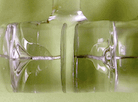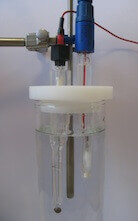Contact
DFM A/S
Kogle Allé 5
DK-2970 Hørsholm
Denmark
Tel: +45 7730 5800
E-mail: [email protected]
CVR/VAT#: DK29217939


Alan Snedden
+45 2545 9046
[email protected]
ELEcTROchemistry

DFM is designated primary laboratory for electrochemistry in Denmark, and covers pH and electrolytic conductivity.
DFM offers certified reference solutions, calibration of customer supplied solutions and calibration of conductivity sensors and measurement systems.
ULTRA-pure water (UPW)
Ultra-pure water is used in a range of processes in the food and pharma industries:
- For production
- Cleaning of facilities
- Dilution of solutions
- Autoclaves
- Sterilization
The assumption in all cases is that the water being used is ”pure”, without any measurable contents af eg. salts. The question is, however, how “pure” the water actually is. Equipment for the measurement of the conductivity of water are an essential tool for finding out how “pure” the water is. For the sake of documentation and traceability, such tools need to be under calibration. DFM’s method allows equipment for the measurement of conductivity of UPW to be accurately calibrated.
ELEcTROLYTIc conductivity
Electrolytic conductivity is a measure of the ability of a liquid to conduct electric current.
The charged particles in a liquid are called ions, and a liquid containing ions is called an electrolyte. The electrolytic conductivity does by itself not provide any details about the chemical properties of the ions, neither about the charge, here understood as the number of elementary charges per ion. Similarly, it is not possible to calculate the concentration of ions based on the conductivity alone. Electrolytic conductivity is, in other words, what is know as a non-specific method. In many cases, however, all this is of no importance; A measurement of the electrolytic conductivity is first and foremost an efficient means to determine whether a liquid is sufficiently “pure”, or perhaps has the appropriate concentration. This is what makes electrolytic conductivity a valued property, and why calibrations of electrolytic conductivity are essential.
Read more about electrolytic conductivity here.
determination of actual reference ELEcTRODE POTENTIAL
Practical realisations of electrochemical reference electrodes will normally have standard potentials that deviate from the tabulated values. It is therefore necessary to know the actual value of potential of the reference electrode.
Read more about reference electrode potential here.




